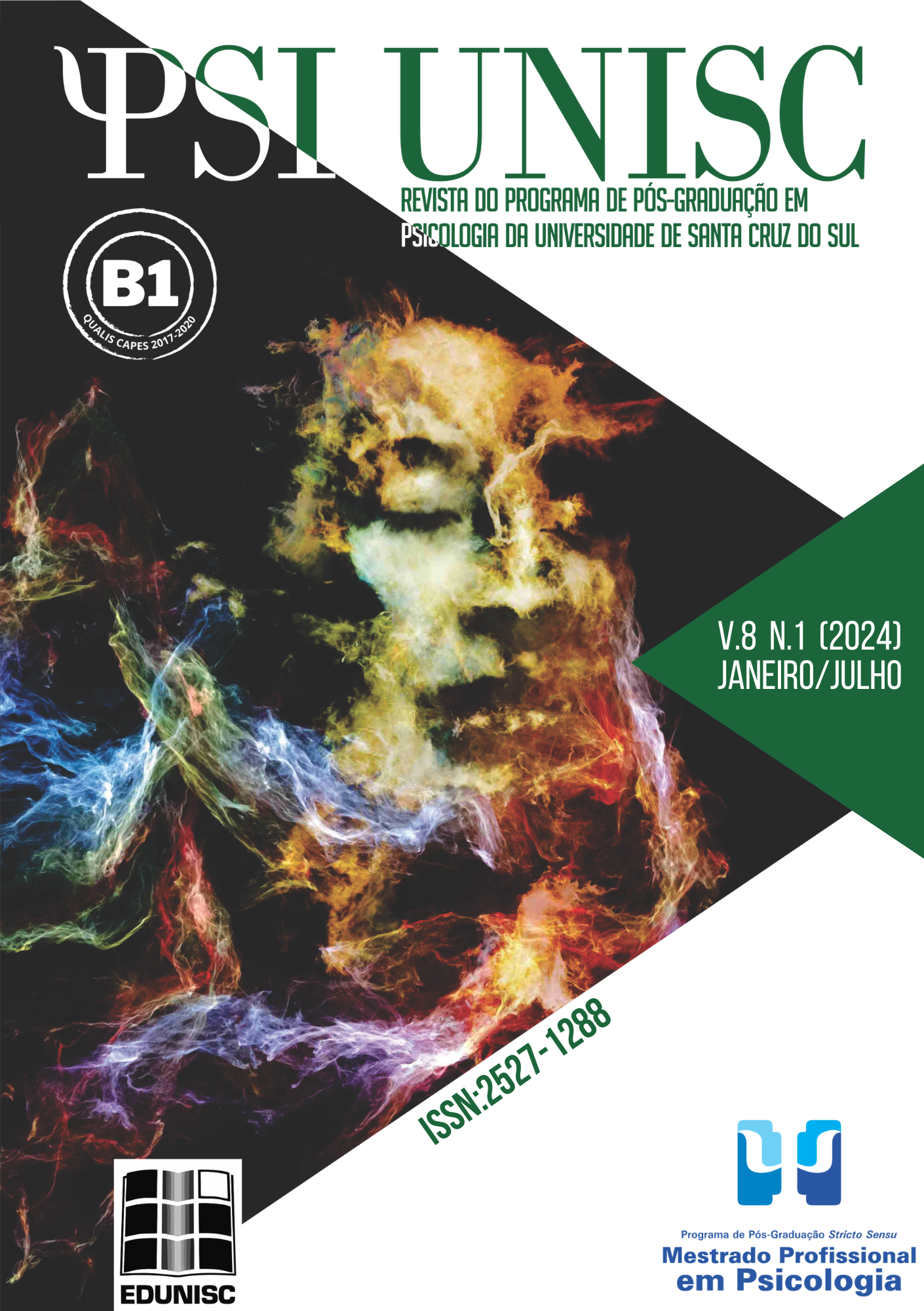Validity evidence of the HIV-related stigma anticipation scale
DOI:
https://doi.org/10.17058/psiunisc.v8i1.18479Keywords:
HIV, testing, stigma, prejudice, sexual behaviorAbstract
HIV-related stigma is one of the main factors associated with negative outcomes among people living with HIV, such as testing avoidance and poor adherence to treatment. The aim of this study is to present evidence of the validity of the HIV-Related Stigma Anticipation Scale (EAER-HIV-7) in the Brazilian context. A total of 428 men, mostly white and heterosexual, participated in the study. Participants answered a protocol containing sociodemographic data, the EAER-HIV-7, the Scale of Prejudice Against Sexual and Gender Diversity (EPCDSG), a questionnaire about knowledge about HIV transmission and questions about perceived risk of HIV infection. The EAER-HIV-7 was translated and cross-culturally adapted. To analyze the data, t-tests were used to assess convergent and between-group validity, as well as confirmatory factor analysis (CFA) to investigate the factor structure. The unidimensional model of the EAER-HIV-7 tested presented good adjustment indices. The results indicate good evidence of reliability of the EAER-HIV-7, suggesting its applicability in the Brazilian context. It is suggested that further studies be conducted in diverse populations, such as women, the elderly, LGBTQIA+ people and married individuals, in order to offer new versions of the tool.
Downloads
References
Aggleton, P., Parker, R. G., & Maluwa, M. (2003). Stigma, discrimination and HIV/AIDS in Latin America and the Caribbean. Inter-American Development Bank, Sustainable Development Department.
Albuquerque, G. A., Garcia, C. D. L., Alves, M. J. H., Queiroz, C. M. H. T. D., & Adami, F. (2013). Homossexualidade e o direito à saúde: Um desafio para as políticas públicas de saúde no Brasil. Saúde em Debate, 37(98) 516-524. https://www.scielo.br/j/sdeb/a/JhwFvPRq3LCSQTqkLgtHZ7f/abstract/?lang=pt
Azevedo, F. M. de, Almeida-Segundo, D. S. de, Feijó, M., Nardi, H. C., & Costa, A. B. (2020). Atribuições de Causalidade pela Infecção por HIV. Estudos e Pesquisas Em Psicologia, 20(3), 751–769. https://doi.org/10.12957/epp.2020.54346
Berger, B. E., Ferrans, C. E., & Lashley, F. R. (2001). Measuring stigma in people with HIV: Psychometric assessment of the HIV stigma scale. Research in nursing & health, 24(6), 518-529. https://doi.org/10.1002/nur.10011
Brasil. (2011). Ministério da Saúde. Secretaria de Vigilância em Saúde. Departamento de DST, Aids e Hepatites Virais. Pesquisa de conhecimento, atitudes e práticas na população brasileira. Brasília: Ministério da Saúde.
Brasil. (2020). Boletim HIV/AIDS 2020. Boletim Epidemiológico. Secretaria de Vigilância em Saúde. Ministério da Saúde, número especial, dez. 2020. https://www.gov.br/saude/pt-br/centrais-de-conteudo/publicacoes/boletins/epidemiologicos/especiais/2020/boletim-hiv_aids-2020-internet.pdf
Borsa, J. C., Damásio, B. F., & Bandeira, D. R. (2012). Adaptação e validação de instrumentos psicológicos entre culturas: Algumas considerações (22nd ed.). Paidéia.
Brown, T. A. (2015). Confirmatory factor analysis for applied research. The Guilford Press.
Browne, M., & Cudeck, R. (1993). Alternative ways of assessing model fit. In K. A. Bollen and J. S. Long (Eds.). Testing structural equation models. Newbury Park.
Catelan, R. F., Azevedo, F. M., Sbicigo, J. B., Vilanova, F., Silva, L.P., Zanella, G. I., ... Nardi, H. C. (2020). Anticipated HIV stigma and delays in HIV testing among Brazilian heterosexual male soldiers. Psychology & Sexuality, 1-14. https://doi.org/10.1080/19419899.2020.1773909
Cazeiro, F., Silva, G. S. N. & Souza, E. M. F. (2021). Necropolítica no campo do HIV: algumas reflexões a partir do estigma da Aids. Ciência & Saúde Coletiva [online], 26, 5361-5370. https://doi.org/10.1590/1413-812320212611.3.00672020
Costa, A. B., Machado, W. de L., Bandeira, D. R., & Nardi, H. C. (2016). Validation Study of the Revised Version of the Scale of Prejudice Against Sexual and Gender Diversity in Brazil. Journal of Homosexuality, 63(11), 1446–1463. https://doi.org/10.1080/00918369.2016.1222829
Costa, A. B., Moura Filho, J. B., Silva, J. M., Beloqui, J. A., Espindola, Y., de Araujo, C. F., ... & de Lima, C. E. (2022). Key and general population HIV-related stigma and discrimination in HIV-specific health care settings: Results from the Stigma Index Brazil. AIDS care, 34(1), 16-20. https://doi.org/10.1080/09540121.2021.1876836
Costa, A. B., Viscardi, L. H., Feijo, M., & Fontanari, A. M. V. (2022). HIV Voluntary Counseling and Testing (VCT-HIV) effectiveness for sexual risk-reduction among key populations: A systematic review and meta-analysis. EClinicalMedicine, 52. https://doi.org/10.1016/j.eclinm.2022.101612
Davis, C., Sloan, M., Macmaster, S., & Hughes, L. (2007). The International AIDS Questionnaire—English Version (IAQ-E): Assessing the Validity and Reliability. Journal of HIV/AIDS Prevention in Children & Youth, 7(2), 29–42. https://doi.org/10.1300/J499v07n02_03
Earnshaw, V. A., Bogart, L. M., Dovidio, J. F., & Williams, D. R. (2015). Stigma and racial/ethnic HIV disparities: Moving toward resilience. Stigma and Health, 1(S), 60–74. https://doi.org/10.1037/2376-6972.1.S.60
Earnshaw, V. A., & Chaudoir, S. R. (2009). From Conceptualizing to Measuring HIV Stigma: A Review of HIV Stigma Mechanism Measures. AIDS and Behavior, 13(6), 1160. https://doi.org/10.1007/s10461-009-9593-3
Fontanari, A. M. V., Zanella, G. I., Feijo, M., Churchill, S., Lobato, M. I. R., & Costa, A. B. (2019). HIV-related care for transgender people: A systematic review of studies from around the world. Social science & medicine, 230, 280-294. https://doi.org/10.1016/j.socscimed.2019.03.016
Froman, R. D., Owen, S. V., & Daisy, C. (1992). Development of a Measure of Attitudes Toward Persons with AIDS. The Journal of Nursing Scholarship, 24(2), 149–152. https://doi.org/10.1111/j.1547-5069.1992.tb00240.x
Genberg, B. L., Kawichai, S., Chingono, A., Sendah, M., Chariyalertsak, S., Konda, K. A., & Celentano, D. D. (2008). Assessing HIV/AIDS Stigma and Discrimination in Developing Countries. AIDS and Behavior, 12(5), 772–780. https://doi.org/10.1007/s10461-007-9340-6
Golub, S. A., & Gamarel, K. E. (2013). The impact of anticipated HIV stigma on delays in HIV testing behaviors: findings from a community-based sample of men who have sex with men and transgender women in New York City. AIDS Patient Care and STDs, 27(11), 621-627. https://doi.org/10.1089/apc.2013.0245
Golub, S. A., Fikslin, R. A., Goldberg, M. H., Peña, S. M., & Radix, A. (2019). Predictors of PrEP uptake among patients with equivalent access. AIDS and Behavior, 23(7), 1917-1924. https://doi.org/10.1007/s10461-018-2376-y
Hamann, C., Pizzinato, A., Weber, J. L. A., & Rocha, K. B. (2017). Narrativas sobre risco e culpa entre usuários e usuárias de um serviço especializado em infecções por HIV: Implicações para o cuidado em saúde sexual. Saúde e Sociedade, 26(3), 651-663. https://doi.org/10.1590/s0104-12902017170669
Harrell, J. P., & Wright, L. W. (1998). The development and validation of the Multicomponent AIDS Phobia Scale. Journal of Psychopathology and Behavioral Assessment, 20(3), 201-216. https://doi.org/10.1023/A:1023020617248
Herek, G. M. (1999). AIDS and stigma. American behavioral scientist, 42(7), 1106-1116. https://doi.org/10.1177/0002764299042007004
Herek, G. M., Saha, S., & Burack, J. (2013). Stigma and psychological distress in people with HIV/AIDS. Basic and Applied Social Psychology, 35(1), 41-54. https://doi.org/10.1080/01973533.2012.746606
Kalichman, S. C., Simbayi, L. C., Jooste, S., Toefy, Y., Cain, D., Cherry, C., & Kagee, A. (2005). Development of a Brief Scale to Measure AIDS-Related Stigma in South Africa. AIDS and Behavior, 9(2), 135–143. https://doi.org/10.1007/s10461-005-3895-x
Link, B. G., & Phelan, J. C. (2001). Conceptualizing Stigma. Annual Review of Sociology, 27(1), 363–385. https://doi.org/10.1146/annurev.soc.27.1.363
Luz, P. M., Torres, T. S., Almeida-Brasil, C. C., Marins, L. M. S., Bezerra, D. R. B., Veloso, V. G., ... Thombs, B. D. (2020). Translation and validation of the Short HIV Stigma scale in Brazilian Portuguese. Health and Quality of Life Outcomes, 18(1), 322. https://doi.org/10.1186/s12955-020-01571-1
Mulford, C. L., & Lee, M. Y. (1996). Reliability and Validity of Aids Victim Blaming Scales. Psychological Reports, 79(1), 191–201. https://doi.org/10.2466/pr0.1996.79.1.191
O’Hea, E. L., Sytsma, S. E., Copeland, A., & Brantley, P. J. (2001). The Attitudes Toward Women with HIV/AIDS Scale (ATWAS): Development and Validation. AIDS Education and Prevention, 13(2), 120–130. https://doi.org/10.1521/aeap.13.2.120.19738
Pelúcio, L., & Miskolci, R. (2009). A prevenção do desvio: o dispositivo da aids e a repatologização das sexualidades dissidentes. Sexualidad, Salud y Sociedad-Revista Latinoamericana, (1) 125-157. Recuperado de https://www.redalyc.org/pdf/2933/293322961007.pdf
Rhemtulla, M., Brosseau-Liard, P. E., & Savalei, V. (2012). When can categorical variables be treated as continuous? A comparison of robust continuous and categorical SEM estimation methods under suboptimal conditions. Psychological methods, 17(3), 354. https://doi.org/10.1037/a0029315
Shrum, J., Turner, N., & Bruce, K. (1989). Development of an instrument to measure attitudes towards AIDS. AIDS Education and Prevention.
Starks, T. J., Rendina, H. J., Breslow, A. S., Parsons, J. T., & Golub, S. A. (2013). The psychological cost of anticipating HIV stigma for HIV-negative gay and bisexual men. AIDS and Behavior, 17(8), 2732-2741. https://doi.org/10.1007/s10461-013-0425-0
Suit, D., & Pereira, M. E. (2008). Vivência de estigma e enfrentamento em pessoas que convivem com o HIV. Psicologia USP, 19, 317-340. https://doi.org/10.1590/S0103-65642008000300004
Tang, W., Wei, C., Cao, B., Wu, D., Li, K. T., Lu, H., ... Tucker, J. D. (2018). Crowdsourcing to expand HIV testing among men who have sex with men in China: a closed cohort stepped wedge cluster randomized controlled trial. PLoS medicine, 15(8). https://doi.org/10.1371/journal.pmed.1002645
Vilanova, F., de Azevedo, F. M., & Steins, G. (2023). A Bayesian Network Perspective on an Attributional Model of Reactions Toward People with HIV. Actualidades en Psicología, 37(134), 117-133. https://doi.org/10.15517/ap.v37i134.46758
Warner, M. (1993). Fear of a queer planet. Queer Politics and Social Theory. University of Minnesota Press.
Worthen, M. G. (2016). Hetero-cis–normativity and the gendering of transphobia. International Journal of Transgenderism, 17(1), 31-57. https://doi.org/10.1080/15532739.2016.1149538
Xiao, W., Yan, L., Chen, L., Fu, G., Yang, H., Yang, C., ... Wei, C. (2020). Sexual network distribution of HIV self-testing kits: Findings from the process evaluation of an intervention for men who have sex with men in China. PLoS One, 15(4). https://doi.org/10.1371/journal.pone.0232094
Zelaya, C. E., Sivaram, S., Johnson, S. C., Srikrishnan, A. K., Solomon, S., & Celentano, D. D. (2008). HIV/AIDS Stigma: Reliability and Validity of a New Measurement Instrument in Chennai, India. AIDS and Behavior, 12(5), 781–788. https://doi.org/10.1007/s10461-007-9331-7
Downloads
Published
How to Cite
Issue
Section
License
The submission of originals to this journal implies the transfer, by the authors, of the printed and digital publication rights. The copyrights for the published articles are those of the author, with periodical rights on the first publication. Authors may only use the same results in other publications clearly indicating this journal as the medium of the original publication. Because we are an open access journal, we allow free use of articles in educational and scientific applications provided the source is cited under the Creative Commons CC-BY license.




